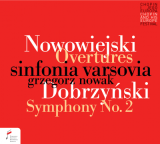 Feliks Nowowiejski: Ouvertüre zum Ballett König der Winde (King Of The Winds), op. 37 + Ouvertüre zu der Oper Baltische Legenden (Baltic Legends), op. 28; Ignacy Feliks Dobrzynski: Symphonie Nr. 2 op. 15; Sinfonia Varsovia, Grzegorz Nowak; 1 CD Narodowy Institut Fryderyka Chopina NIFCCD 060; Liveaufnahmen 2016, Veröffentlichung 04.2021 (62'42) – Rezension von Remy Franck
Feliks Nowowiejski: Ouvertüre zum Ballett König der Winde (King Of The Winds), op. 37 + Ouvertüre zu der Oper Baltische Legenden (Baltic Legends), op. 28; Ignacy Feliks Dobrzynski: Symphonie Nr. 2 op. 15; Sinfonia Varsovia, Grzegorz Nowak; 1 CD Narodowy Institut Fryderyka Chopina NIFCCD 060; Liveaufnahmen 2016, Veröffentlichung 04.2021 (62'42) – Rezension von Remy Franck

Der polnische Komponist, Organist und Dirigent Feliks Nowowiejski (1877-1946) komponierte schon mit 10 Jahren sein erstes Klavierstück. Nachdem er eine Kantate an die Königliche Akademie der Künste in Berlin eingesandt hatte, wurde er im Jahre 1900 in die Meisterklasse für klassische Komposition unter Max Bruch aufgenommen. Er wurde Kompositionslehrer, gleichzeitig Organist und Chorleiter an der St.-Hedwigs-Kathedrale und später an der Dominikanerkirche St. Paulus in Berlin. Ab 1909 wirkte Nowowiejski in Krakau, ging aber nach Kriegsausbruch aufgrund zunehmender Anfeindungen in Polen nach Deutschland zurück. 1918 ließ er sich in Poznan nieder und war dort als Dozent am Musikkonservatorium, sowie als Komponist, Dirigent und Chorleiter tätig. Er wurde ein Exponent des polnischen Patriotismus, was zum Streit mit seinem einflussreichen Lehrer Max Bruch führte, der erreichte, dass Nowowiejskis Musik in Deutschland von den Spielplänen verschwand.
1941 beendete ein Schlaganfall Nowowiejskis Laufbahn. Der Musiker starb 1946 in Poznan.
Auf dieser CD ist er mit zwei wunderbaren Ouvertüren vertreten, jener des Balletts König der Winde und der seiner Oper Baltische Legenden. Beide haben den Charakter einer Filmmusik und könnten definitiv von John Williams geschrieben worden sein.
Ignacy Feliks Dobrzynski (1807-1867) ist international noch immer nicht sehr bekannt, und Schallplatten mit seinen Werken kann man auf einer Hand aufzählen.
Seine Zweite Symphonie entstand 1834 und wurde 1862 revidiert, u.a. erhielt sie einen komplett neuen zweiten Satz, dessen Material aber aus einem Kammermusikwerk stammt.
Es ist eine klassische Symphonie mit romantischen Tendenzen. Sie trägt den Untertitel ‘Charakteristische Symphonie im Geiste der polnischen Musik’.
Die Interpretationen sind opulent, aber man hätte sie sich detailreicher gewünscht. Die etwas hallige Akustik hat das wohl noch mehr verhindert als das engagierte Spiel des Orchesters.
Polish composer, organist, and conductor Feliks Nowowiejski (1877-1946) composed his first piano piece at the age of 10. After submitting a cantata to the Royal Academy of Arts in Berlin, he was accepted into the master class of Max Bruch in 1900. He became a composition teacher, and at the same time organist and choirmaster at St. Hedwig’s Cathedral and later at the Dominican Church of St. Paul in Berlin. From 1909 Nowowiejski worked in Krakow, but returned to Germany after the outbreak of war due to increasing hostility in Poland. In 1918 he settled in Poznan, where he was a lecturer at the Conservatory of Music, as well as a composer, conductor, and choir director. He became an exponent of Polish patriotism, which led to a dispute with his influential teacher Max Bruch, who succeeded in having Nowowiejski’s music disappear from the playbills in Germany.
In 1941, a stroke ended Nowowiejski’s career. The musician died in Poznan in 1946.
On this CD he is represented by two wonderful overtures, that of the ballet King of the Winds and that of the opera Baltic Legends. Both have the character of a film score and could definitely have been written by John Williams.
Ignacy Feliks Dobrzynski (1807-1867) is still not very well known internationally, and records with his works can be listed on one hand.
His Second Symphony was written in 1834 and revised in 1862. It received a completely new second movement, whose material was taken from a chamber music work.
It is a classical symphony with romantic tendencies. It is subtitled ‘Characteristic symphony in the spirit of Polish music’.
The interpretations are opulent, but one would have liked them more detailed. The somewhat reverberant acoustic probably hindered that even more than the orchestra’s committed playing.
























